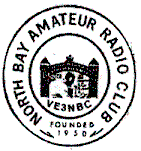Ken VA3SK - "Timing always right for Smith" North Bay Nugget
Primary tabs
http://www.nugget.ca/ArticleDisplay.aspx?e=3094203
Timing always right for Smith
By KEN PAGAN, THE NUGGET
It's somewhat of a hobby for Ken Smith, something he does as a volunteer on his own time.
But being among a handful with the expertise and earning a reputation for knowing how to make things work can go a long way — it took him to ice level as a go-to guy during the NHL All-Star skills competition this season.
The unique skill?
Smith, an electrical engineer with Ontario Power Generation, has developed a program used in timing devices at elite levels of alpine ski racing. When the same company (Alpha Sports Timing) was hired to supply equipment for the NHL All-Star skills competition in Raleigh, N.C., it was Smith who was called upon to help.
Some of the key devices used at the NHL's big show were fine-tuned in the basement of his Camelot Street home in North Bay, where he first got involved in the "hobby" while helping out with timing during North Bay Ski Racers events at Laurentian Ski Hill.
Having become familiar with equipment suppliers over the last six years, Smith has done some tweaking of his own. He's been called upon for technical support in working FIS NorAm ski races in Collingwood and Alberta and has also overseen timing for the past two OFSAA alpine ski championships.
"I guess they sort of discovered I had a knack for making things work," Smith said.
Essentially, Smith wrote the software for making data from a radar gun compatible with a large electronic display board, a challenge he first tackled at a FIS downhill ski event in Lake Louise, Alta., three years ago.
"The data that comes out of the radar gun was different than what could be processed by the display board, so in typical fashion, they sent it to me and said, 'Can you make this work?'" Smith said. "I built a little microprocessor that would take the data out of the radar gun and reformat it to send it to the display board. I built that for them and the last couple of years, they have been using that for the NHL skills competition."
At this season's NHL skills competition, there were added challenges in making data available to broadcasters. Smith was summoned for technical support, spending a full three days before the event setting up and ensuring smooth operation.
In addition to operating the timing for the fastest-skater and hardest-shot competitions from his "office" in the penalty box, he spent a lot of time beforehand in the broadcast truck helping format the data properly for on-screen graphics.
It all nearly went off without a hitch, aside from a couple of slapshots from Washington Capitals superstar Alex Ovechkin that didn't register, likely because of a loose connection. It could have been worse, especially with 20 million people watching on TV.
Those types of glitches can come up when there are 20,000 fans in the building and ice level is crawling with players and officials.
But Smith has enough experience with ski racing — a dog on the hill triggering a timing device while a skier is on course, for instance — to be cognizant of the possible hazards.
"If something can go wrong, it probably will," he said. "There are so many officials down there, you have to account for every possible scenario."
The ice is also jammed with players eager to test their skills and if they're smart, they would speak to a guy like Smith about the timing equipment.
Such was the case with Boston Bruins defenceman Zdeno Chara, who won the hardest-shot competition with a record blast measured at 105.9 miles per hour.
"I got talking to Chara after he did his shots and I explained the gun to him," said Smith.
"He had already done his shots, so it didn't mean anything, but I told him where the fastest point would be. He was just happy he broke his own record.
"It was a lot of fun."
Next year's NHL All-Star game is in Ottawa and Smith wouldn't mind being asked to lend his support again.
"I'm sort of hoping to go again next year," he said. "I've got one under my belt and I understand some of the issues they have. They always seem to have trouble getting the data to the broadcasters, so I'm hoping to do some investigative work this year to see if there are better ways to work with the broadcasters.
